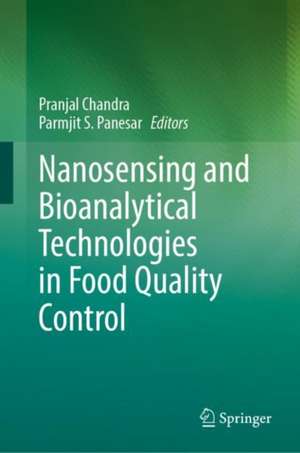Nanosensing and Bioanalytical Technologies in Food Quality Control
Editat de Pranjal Chandra, Parmjit S. Panesaren Limba Engleză Hardback – 29 mar 2022
| Toate formatele și edițiile | Preț | Express |
|---|---|---|
| Paperback (1) | 1224.06 lei 6-8 săpt. | |
| Springer Nature Singapore – 30 mar 2023 | 1224.06 lei 6-8 săpt. | |
| Hardback (1) | 1230.21 lei 6-8 săpt. | |
| Springer Nature Singapore – 29 mar 2022 | 1230.21 lei 6-8 săpt. |
Preț: 1230.21 lei
Preț vechi: 1500.26 lei
-18% Nou
Puncte Express: 1845
Preț estimativ în valută:
235.51€ • 242.34$ • 198.52£
235.51€ • 242.34$ • 198.52£
Carte tipărită la comandă
Livrare economică 01-15 martie
Preluare comenzi: 021 569.72.76
Specificații
ISBN-13: 9789811670282
ISBN-10: 9811670285
Pagini: 438
Ilustrații: X, 438 p. 104 illus., 98 illus. in color.
Dimensiuni: 155 x 235 mm
Greutate: 0.8 kg
Ediția:1st ed. 2022
Editura: Springer Nature Singapore
Colecția Springer
Locul publicării:Singapore, Singapore
ISBN-10: 9811670285
Pagini: 438
Ilustrații: X, 438 p. 104 illus., 98 illus. in color.
Dimensiuni: 155 x 235 mm
Greutate: 0.8 kg
Ediția:1st ed. 2022
Editura: Springer Nature Singapore
Colecția Springer
Locul publicării:Singapore, Singapore
Cuprins
Chapter 1_Introduction to Nanobiosensing technologies and bioanalytical systems.- Chapter 2_Nanobiosensing for Food Safety.- Chapter 3_Biosensors in Food Processing, Safety, and Quality Controlin Food Engineering.- Chapter 4_MIcrofluidic technology for the Evaluation of Natural Toxins.- Chapter 5_Printed Chip-based technology for real-time assessments of food adulterents.- Chapter 6_Optoelectronic systems for Antioxidant in Foods and Beverages.- Chapter 7_Multiplexing nanoengineered technology in food-industries.- Chapter 8_Translational Bioanalytical Techniques in Food Science and Technology.- Chapter 9_Electronic noses and tongues in Food Science.- Chapter 10_Application of Nanotechnology in Food Ananlysis.- Chapter 11_Molecular techniques in detection of Foodborne pathogens.- Chapter 12_Molecular techniques for GMO and Transgenic Foods.- Chapter 13_Aptamer based miniaturized technology for drug analysis. .- Chapter 14_Advanced techniques for detection of food adulterations and allergens.- Chapter 15_Industrial technologies for food quality control.
Notă biografică
Prof. Pranjal Chandra is an Assistant Professor at the School of Biochemical Engineering, Indian Institute of Technology (BHU), Varanasi, India. He earned his Ph.D. from Pusan National University, South Korea and did post-doctoral training at Technion-Israel Institute of Technology, Israel. His research focus is highly interdisciplinary, spanning a wide range in biotechnology, nanobiosensors, material engineering, and nanomedicine. He has designed several commercially viable biosensing prototypes that can be operated for onsite analysis for biomedical diagnostics. He is a guest editor and an editorial board member of various international journals. He is author of over 110 high impact publications including research / reviews papers and invited book chapter. He has published 11 books on various aspects of biosensors/medical diagnostics. Dr. Chandra is the recipient of many prestigious awards, coveted honours, and fellowships such as: DST Ramanujan fellowship (Government of India); Early Career Research Award (ECRA) (DST, Government of India); BK -21 and NRF fellowship, South Korea; Technion Post-Doctoral Fellowship, Israel; Nano Molecular Society India Young Scientist Award; Biotech Research Society India (BRSI) Young Scientist Award; Young Engineers Award 2018; Highly Cited Corresponding authors in The Royal Society of Chemistry (RSC), Cambridge, London; Top 10% cited article in the General Chemistry Section RSC Jounal, Cambridge, London, Gandhian Young Technology Innovation Award (GYTI) 2020, etc. Dr. Chandra is also listed among the world’s top 2% scientist in a report by Stanford University, USA.
Prof. Parmjit S. Panesar is working as a Dean (Research & Consultancy), Department of Food Engineering & Technology, Sant Longowal Institute of Engineering and Technology (Deemed to be University: Established by Govt. of India), Longowal, Punjab, India. Earlier, he has also served as Head, Department of Food Engineering & Technology, SLIET Longowal, Punjab, India. In 2005, he was awarded BOYSCAST (Better Opportunities for Young Scientists in Chosen Areas of Science & Technology) fellowship by the Department of Science & Technology (DST), Ministry of Science & Technology, Govt. of India. Prof. Panesar was awarded the Young Scientist Fellowship by Punjab State Council for Science & Technology, India. His research is focused in the area of value addition of food industry by-products, green extraction of bioactive from food industry by-products, food fermentation, food enzymes, prebiotics, biopigments, biodegradable films. He has published more than 150 research articles in peer-reviewed journals of high repute, 32 chapters and has authored/edited 07 books. He is a member of the editorial advisory boards of several journals, including the International Journal of Biological Macromolecules, Journal of Food Science & Technology, Carbohydrate Polymer Technologies & Applications. He acted as a former member of the National level Scientific Panel on “Genetically modified organisms and foods” by the Food Safety and Standards Authority of India (FSSAI) &Member in the international collective of experts of Foundation for Science and Technology(FCT), Portugal.
Textul de pe ultima copertă
This book reviews applications of nanomaterial and nanodevices in the food industry. It also discusses the advanced bioanalytical techniques, including Enzyme-Linked Immunosorbent Assay (ELISA), immunoanalytical techniques, monoclonal antibody-based immunological techniques for detecting food adulterations and allergens. It comprehensively covers electrode modification and nano-engineered fabrication of biosensors to enhance their functionalities for utilization in food industries. The book highlights the utilization of nanobiosensors for food safety and quality analysis, such as detection of toxin, food-borne pathogen, allergen, and evaluation of toxicity. Further, it also summarizes the recent advances in nanodevices such as nano-systems, nano-emulsions, nanopesticide, nanocapsule and their applications in the food industry. Lastly, it covers nanomaterial-based sensors for drug analysis in diverse matrices. It serves as an invaluable source of information for professionals, researchers, academicians, and students related to food science and technology.
Caracteristici
Reviews the application of biosensors in food safety, analysis, quality, control, and processing Highlights advancements in bioanalytical techniques for the detection of food adulteration and allergens Presents nano-based aptamers for drug analysis
